- Home
- Jason Matthews
Red Sparrow Page 20
Red Sparrow Read online
Page 20
She thought of how her foot had been ruined by that tart Sonya. She remembered the green-agony scream in the shower room at the AVR. She flashed to the orange overhead light as a helpless Delon withered before the thugs, and remembered the taste of Ustinov’s blood in her mouth. And she saw Anya’s milkmaid face choked blue.
Let them wait, she decided, determination welling up inside her. This would be horribly dangerous, potentially fatal. Her resolve was fragile, exquisite, forbidden—the power she would wield over Volontov and Uncle Vanya would be real. Her mother was always telling her to control her temper, and now the icy bite in her throat was exhilarating.
She began walking again, her heels clicking on the sidewalk. There was something else, a realization that surprised her. She knew enough about the Game to know that Nate would be destroyed, his reputation obliterated, if he lost his agent. She replayed their time in Helsinki. She would not do that to him, thinking how much Nate was like her father, how much she liked him.
=====
The next morning, sick to her stomach, she showed her pass at the embassy front door, walked across the courtyard, and climbed the marble steps to the attic, steps worn smooth by countless officers who had served before her. Sluzhba Vneshney Razvedki, the Foreign Intelligence Service. At the top of the stairs was the massive vault door on massive hinges, then the day door with the cipher lock, then the privacy wire gate with the electric keypad. She put her purse down on her desk, nodded to a colleague. Volontov stood at his office door, beckoning.
Dominika stood in front of his desk, unable to take her eyes away from his doughy hands. “Any developments to report, Corporal?” asked Volontov. He was cleaning his nails with a letter opener. Her heart was racing and the pounding in her head would not stop. Did it show? Did he know something? She heard her voice in her head, as if someone else in the room were speaking.
“Colonel, I have discovered that the American seems to favor museums,” said Dominika. Her voice sounded wooden. “I have invited him to the Kiasma art gallery soon. I plan to have dinner afterward… in my apartment.” What was she saying? The very thing Volontov wanted to hear. Volontov looked up from his manicure, grunted, then stared at her breasts.
“It’s about time. Make sure you entertain him so he will want to visit you again,” he said. “You haven’t seen anything out of the ordinary?”
Three words—Yes, I have—and the machine would take over, her responsibility would be over. A simple sentence—He said he is busy the next two weeks—was all that would be necessary. The roaring in her ears grew louder and the edges of her vision clouded. Dominika could barely make out this hog behind his desk, wrapped in his dingy orange haze. Her throat closed and she was amazed to feel her legs tremble, knees actually knocking, quite extraordinary, and she resisted leaning against the desk, willed herself to stop. Volontov continued looking at her chest, a wing of pomaded hair sticking out from the side of his head. In the last millisecond, Dominika decided.
“There’s nothing to report at this time,” she said, heart pounding. She had stepped across the line separating being guilty of an infraction to committing treason against the State. They would find out, they would send men with ice picks to stab her to death like Trotsky. They would roll her mother into a furnace. Volontov looked at her for a moment, grunted again, and waved her out of his office. In a flash, Dominika knew he suspected nothing. She was sure of her instincts and felt the ice in her veins, tingling.
Dominika returned to her desk, sat heavily in her chair. Her hands were damp and shaking, and she looked around the room at the officers and secretaries at the other desks. All had their heads down, reading, typing, or writing. Except Marta Yelenova, sitting at a desk two across from Dominika’s. Marta was holding a cigarette, staring at her. Dominika smiled thinly and looked away.
Marta, Dominika supposed, was the closest thing she had to a friend in the Embassy. She was the senior administrative assistant in the rezidentura. They had spoken in the office occasionally, had sat next to each other during a dinner for some unknown embassy colleague. They had met one rainy Sunday for a walk along the harbor and among the fresh food stalls in Market Square. Marta was elegant, aristocratic, about fifty, with thick brown hair that she wore down to her shoulders. She had dark, prominent eyebrows over the most striking hazel eyes. Her fine mouth tended to turn up at the corners in a wry smile that hinted at an unshakably cynical view of the world. She was one of those with strong color about her head and body, a deep ruby red of passion and heat, a red as when Dominika listened to music.
Dominika thought that Marta must have been a beauty in her youth. She rounded on any man in the office who made even the slightest comment about her Junoesque figure, now a little thick around the waist, sending him scuttling for the exit. Marta was not in the least fazed by Rezident Volontov, characteristically telling him that he would get the voucher, or the accounting, or the monthly report, when she finished it. Volontov could not dent her Olympian aplomb.
=====
Dominika previously knew nothing about Marta’s life, but if she had, she would have been amazed to learn that Marta Yelenova had, in 1983, been conscripted by the KGB to attend State School Four—Sparrow School—in the forest outside Kazan. She was twenty years old. Her father had fought in the Great Patriotic War, then became an NKVD guard at the Leningrad headquarters, a party member, a loyal vassal of the State. Marta’s heartbreaking beauty had been noticed by a KGB major from Moscow making an inspection tour, and he arranged for her to be hired into the Service as, he originally hoped, his special assistant. Marta’s father, who knew the game but nevertheless hoped for a better life for her, said nothing, and sent his only daughter to Moscow to live with his sister and to begin work in the KGB’s Second Chief Directorate (internal security), Seventh Department (operations against tourists), Third Section (hotels and restaurants). The Seventh Department alone employed two hundred officers and sixteen hundred part-time informants and agents.
Now in Moscow, it was inevitable that Marta would be noticed by an SCD colonel, who outranked the major, and who assigned her to his staff. She was subsequently noticed by an SCD general, who outranked the colonel, and who made her his adjutant, even though Marta had no idea what an adjutant’s duties entailed. She found out when the general one afternoon forced her down on the divan in his office and put his hand under her uniform skirt. Marta hit him on the side of the head with a (typically Soviet) steel water carafe. The resultant scandal in the strangely puritanical KGB was exacerbated by the fact that the general’s wife was the sister of an alternate Politburo member. Marta was hurriedly transferred to State School Four. She had no choice. Marta was going to learn to be a Sparrow.
Marta had the rare combination of a sublime allure and a superior intellect. The former quality served to attract hapless foreign diplomats, journalists, and businessmen. The latter gave her perspective and a keen eye for making influential friends. At the end of her nearly twenty-year career, Marta was known as Koroleva Vorobey, Queen Sparrow. She had participated in scores of SCD honey traps, among which were included the recruitments by the KGB of a sex-crazed Japanese billionaire, a philandering British ambassador, and a reptilian Indian minister of defense. At the apex of Marta’s career, she was the bait in the legendary seduction, compromise, and recruitment of a cipherine, a female code clerk working in the German Embassy, the suborning of whom enabled the KGB to read German and NATO encrypted traffic for an uninterrupted seven years. It was the only time Marta worked against another woman, but the recruitment was still taught at KGB Higher School as a classic operation.
Over the years, Marta’s nonoperational romances included discreet affairs with two members of the Politburo, with a general in the First Chief Directorate, and with various sons of influential officials in the Collegium of the KGB. Many bushy-browed old bosses remembered her with affection. Thanks to these “mentors,” Marta was bulletproof and was given an SVR major’s pension on retiring from Sparrow operations by grateful if
exhausted benefactors. Marta decided to enjoy life and see a little of the outside world, so she requested and was readily granted an overseas assignment, to Helsinki.
=====
At first Marta did not know whether Dominika was SVR clerical or administrative. She certainly was very young to be assigned overseas. The last name explained much, but the fact that Dominika had no steady duties in the rezidentura, came and went as she liked, and spoke directly and privately with the rezident suggested that she was in Helsinki under a special charter. Dominika’s clothes were new, she must have been provided a wardrobe. Office gossip accelerated when it was discovered that this beautiful newcomer had been assigned a private apartment outside the block reserved for all embassy personnel. To Marta, that had a familiar ring to it.
In the rezidentura she was correct, reserved, did her work quickly and well, with an uncommon intensity. On the street, Marta saw how Dominika’s eyes flitted from people’s faces to the doors, along the sidewalk, across the street, using normal movements to mask her constant glances. When they were sitting together at a café, there was the flash of gratifying intuition, a hint of playfulness, the brilliant smile. Marta knowingly identified Dominika’s nearly unconscious use of her beauty—eyes, smile, body—in her interactions. And when they talked, Marta recognized how Dominika used techniques of conversation and elicitation.
Quite a creature, thought Marta, and in operations! Beauty, brains, tradecraft, and incandescent blue eyes. It was apparent that she knew her duty, loved her country, but there was something beneath the surface, an underground spring bubbling unseen. Pride, anger, disobedience. And something else, hard to define, a secret side, an addiction to rebellion, as if she courted risk. Marta wondered how long it would be before this young woman, with her discerning eye and natural instincts, would realize that the Center’s work was pokazukha, something done solely for effect, for show. Rezident Volontov was an extreme example of the work ethic, the type of functionary who had run the KGB and the Kremlin for the last seventy years.
They began walking out of the embassy at the end of the day, stopping at a local bar for a glass of wine and a sinful slice of caviar pie oozing crème fraîche and cheese. They spoke of family, of Moscow, of experiences. Dominika did not mention Sparrow School. Marta laughed and made Dominika laugh, and they walked arm in arm down the sidewalk at the end of the evening.
One night in a bar, after smoothly telling a disgusting German to leave them alone, Marta told Dominika her life story, about her career as a Sparrow. She was proud of having served her country; she didn’t think about the beastly years of the KGB. She was not in the slightest ashamed of who she was or what she’d done. Dominika’s lip trembled and she looked at her friend and began silently weeping. It was a long evening after that, but Marta knew everything about Dominika in the end. The assignment to pursue Nate, Uncle Vanya, Sparrow School, the Frenchman Delon, even Ustinov. The words came out of Dominika in a flood. There was no thought about elicitation or manipulation. The two women thereafter were, simply, friends.
Evening after evening, cool and collected, Marta listened and thought, My, how the vlastiteli, the bosses, have wrung quite a lot out of this girl in such a short time. But Marta saw strength in Dominika, and something else. Marta suspected Dominika’s exposure to the easygoing young American CIA officer was creating deeper reactions as well. To have said so would have been to imply that Dominika could not operate correctly, so Marta said nothing.
“I don’t know,” said Dominika. “He’s arrogant, he’s facetious, he doesn’t like Russia, or at least he doesn’t give us much credit. Uncle Vanya believes he is a desperate operative.”
“He sounds unpleasant,” said Marta. “But it should make it easier to work against him—even to sleep with him—to get what you want.” She lit a cigarette and looked at Dominika leaning back in the booth. They were on their third glass of wine.
“Not so much unpleasant as frustrating. But nice.” She sighed. “I am supposed to tell Volontov when I think he’s operational, distracted. They want to catch him with his agent.” Dominika was feeling the wine.
“And do you know him well enough to do that?” asked Marta. “Will you be able to know?”
Dominika brushed a lock of hair off her forehead. “I think I already have—I mean, I already do,” she said.
“And you ran right in and reported to Colonel Volontov,” said Marta. She already knew what was happening.
“Not exactly,” said Dominika. “I told him I would keep watching.”
“And you positively did not report that you suspected your young American was becoming busy.”
“He’s not my ‘young American,’” said Dominika, her eyes closed.
“But you suspect it’s so, and Volontov asked you outright, and you didn’t say a thing, correct?” asked Marta, leaning toward Dominika. “Open your eyes, look at me.”
She opened her eyes. “Correct. I didn’t say anything.” She closed her eyes.
Marta sipped her wine, noting with some detachment that Dominika not only had committed treason against the State—saying treason against the Duma sounded ridiculous—by not reporting and lying about it, but also had that evening made Marta likewise guilty of treason for having heard about the crime. She reached out and squeezed Dominika’s hand. “You must be careful,” she said.
Marta had devoted her life to the State, had for years ignored its excesses and personally contributed to the downfall of men whose only sin was to succumb to the pleasures of the flesh. But inside, she had long since broken with the bastards. She knew what a situation Dominika was in. The beasts, she thought, they will utterly empty this beautiful, intelligent girl, then cast her aside. And if what she was doing even remotely thwarted Vladimir Putin, it would be mortally dangerous. Dominika’s knowledge was like a knotted bag of snakes—safe for the moment, but don’t bang it against the wall.
=====
MARBLE’s short visit to Helsinki was a triumph in multiple ways. First, MARBLE himself met and made significant progress with Trade Minister Trunk, thus incontrovertibly establishing the continuing need to pursue the flamboyant Canadian. Second, three nights of midnight-to-dawn meetings in the Hotel GLO with Nate had already produced eight highly graded intelligence reports (with notes for a possible thirty-seven more) on SVR operations in Europe and North America. Third, MARBLE provided the name of an assistant commissioner in the RCMP’s Strategic Policy and Planning Directorate who was meeting a Russian illegal (whose day job was as a dancer at the Bare Fax in Ottawa). Last, the old agent repeated from memory—he did not normally have access to China reporting—the gist of three superb SVR reports from Beijing detailing the power struggle still smoldering within the Politburo Standing Committee fully two years after the removal of Bo Xilai in early 2012. MARBLE’s “source comments” regarding President Putin’s interest—“significantly obsessive,” he called it—in Chinese Communist Party disunity were highly valued by analysts.
That was just the positive intelligence from MARBLE. The most explosive item was a hint MARBLE had picked up that there was a “Director’s Case” being run out of the fourth floor of Yasenevo, an asset in the pay of Russia so important and so sensitive that SVR leadership were running the case exclusively. To CIA counterintelligence, this special handling could only mean a megamole. Some government, some country, had a big problem, was gravely penetrated, and they all looked at one another and wondered if it was in Washington. That intel tidbit was compartmented from the rest of MARBLE’s reporting and handled separately.
No one had to tell the old spook what to do about this. He told them what he would do. He knew how to pull the string with his fingertips, how to be the spider sitting on the web, waiting for the tremble of the radius threads. He would collect—softly, softly—more information when he could. Meanwhile, the words SVR mole, Director’s Case, and Yasenevo went on the office whiteboards of a dozen counterintelligence analysts in CIA headquarters. They were good at waiting, t
hey would wait for months, even years, to fit more pieces into the mosaic.
The last evening, MARBLE told Nate that Anthony Trunk would within the next six months attend an economic conference in Rome as well as the UN General Assembly in New York, providing two future opportunities for MARBLE to travel out of Russia with plausible cover provided by the SVR’s pursuit of Trunk.
Headquarters was pleased with this round of MARBLE meetings and with Nate’s performance. A bonus was deposited in MARBLE’s secret fund account, and Nate was awarded a Quality Step Increase amounting to a salary bump of $153 per pay period, after taxes. “Wicked good,” said Gable when he heard about Nate’s QSI. “One hundred and fifty-three dollars. Just as long as they don’t fucking devalue your contribution. You realize you also get a voucher for six free car washes?”
=====
At the end of the meeting series, before MARBLE returned to Moscow, Nate pushed gently about the general’s security. MARBLE rather nonchalantly acknowledged that since he and Nate had narrowly missed being rolled up on the snowy Moscow street that one night—it seemed like a hundred years ago—there was a serious mole hunt going on inside SVR headquarters in Yasenevo. His old comrade First Deputy Director Egorov was convinced someone senior in the Russian service was spying for the CIA. “In other words… me,” he said with a laugh. Nate’s concern showed on his face.
“Look,” said MARBLE, “I am used to the risk. I know how my Service works. I know how that zhulik, that old fraud Egorov, thinks and operates. There’s no cause for alarm.” He thought to himself about fourteen years as Langley’s agent, of wakeful nights listening to footfalls in the stairwell, or feeling the tightness in his chest when called back to Moscow “for consultations.” He remembered the inexpressible wave of relief on seeing a full conference room after being summoned to a meeting. Others before him had entered an empty meeting room with the ubijca, the thugs, waiting behind the door.

 Shep Dreams of Home
Shep Dreams of Home Extreme Skiing and Psychedelic Mushrooms: The Art of Chasing Fear
Extreme Skiing and Psychedelic Mushrooms: The Art of Chasing Fear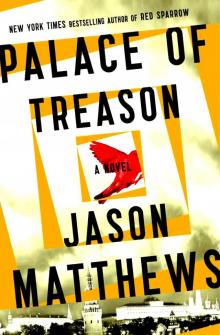 Red Sparrow 02 - Palace of Treason
Red Sparrow 02 - Palace of Treason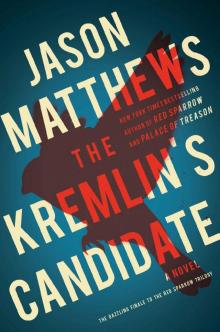 The Kremlin's Candidate
The Kremlin's Candidate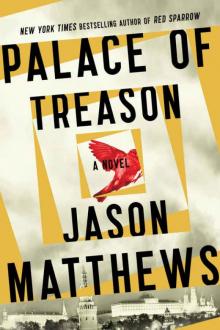 Palace of Treason
Palace of Treason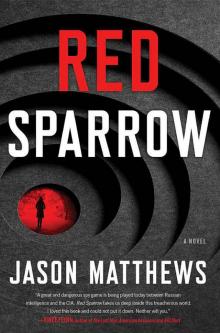 Red Sparrow
Red Sparrow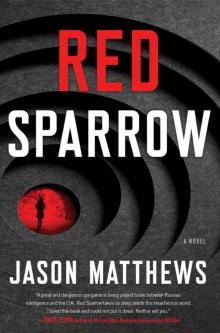 Red Sparrow: A Novel
Red Sparrow: A Novel